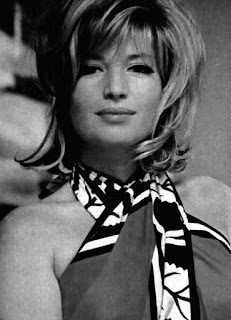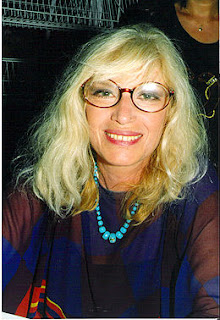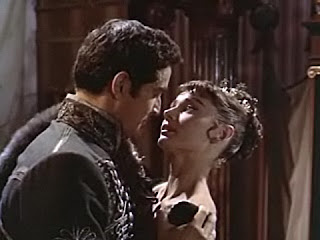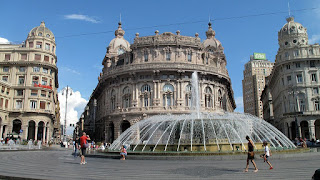‘Queen of the Big Top’ became cultural icon
 |
| Moira Orfei rarely strayed from her trademark look, with heavy make-up and a turban-style hairdo |
She had a trademark look that became so recognisable that advertising posters for the Moira Orfei Circus, which she founded in 1961 with her new husband, the circus acrobat and animal trainer Walter Nones, carried simply her face and the name 'Moira'.
As a young woman, she was a strikingly glamorous Hollywood-style beauty but in later years she took to wearing heavy make-up, dark eye-liner and bright lipstick, topped off with her bouffant hair gathered up in a way that resembled a turban. Her camped-up appearance made her an unlikely icon for Italy’s gay community.
Born Miranda Orfei, she spent her whole life in the circus. Her father, Riccardo, was a bareback horse rider and sometime clown; her mother, part of the Arata circus dynasty, gave birth to her in the family’s living trailer. Growing up, she performed as a horse rider, acrobat and trapeze artist.
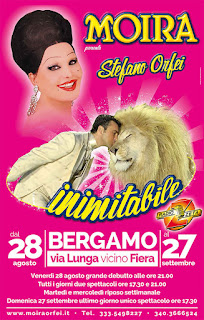 |
| Posters for Circo Moira Orfei always featured her face and first name |
The so-called sword-and-sandal genre, very popular in Italy at the time, remained her speciality until she was given parts in a couple of comedies written for the great Italian comic actor, Totò.
Thereafter, although the adventure epic remained her staple, her acting talent was recognised in several movies that fell into the commedia all’Italiana genre.
She was in a cast headed by Marcello Mastroianni and Virna Lisi in Mario Monicelli’s Casanova ‘70 (in which her cousin, Liana Orfei, appeared as a lion tamer), played alongside Virna Lisi again in Pietro Germi’s Signore e Signori, with Nino Manfredi and Ugo Tognazzi in Dino Risi’s Straziami ma di baci saziami (Torture Me But Kill Me with Kisses), and with Vittorio Gassman in the Dino Risi classic Profumo di donna (Scent of a Woman).
Meanwhile, Circo Moira Orfei went from strength to strength. With Nones presenting obedient lions or tigers, she presented the circus’s performing elephants.
 |
| As a young actress, Orfei was a star of many sword-and-sandal adventure movies |
In 1969, she and Nones launched Circo sul Ghiaccio - Circus on Ice - a monumental production which combined a circus ring and a skating rink. A highly elaborate show featured frequent set and costume changes and an international cast of circus and stars.
Circus on Ice toured in a huge big top, the largest seen in Italy. Moving from place to place involved 10 tractors, 34 articulated buses, two special trains and more than 100 caravans.
Orfei retired from performing in the late 1990s, although she continued to supervise every detail of the business. She suffered some setbacks, including a serious car crash in 2000 that left her with a broken leg and five broken ribs, and a stroke in 2006, which happened during a show in Reggio Calabria and required her to take more than a year off in recuperation.
Subsequently, her active participation in shows was limited, although she would usually parade round the ring at the start, welcoming the audience. Her son and daughter, Stefano and Lara, followed in the family tradition and became part of the show, he becoming one of Europe's foremost animal trainers, she a talented equestrian.
Moira Orfei died in Brescia in 2015 a month ahead of what would have been her 84th birthday, passing away in her sleep in her trailer, having continued to follow the itinerant life of the circus to the end. Her funeral was held in San Donà di Piave - 40km (25 miles) from Venice and about 60km (37 miles) southwest of Codroipo.
A crowd put at around 5,000 watched the funeral cortege, with a hearse drawn by four white Lipizzaners - the breed closely associated with the Spanish Riding School of Vienna - carrying her coffin to the tune of a marching band playing circus music.
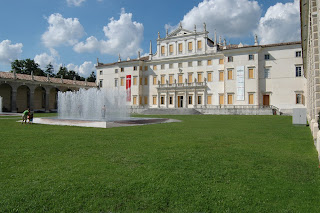 |
| The Villa Manin in Codroipo, once home of Ludovico Manin, the last Doge of the Venetian Republic |
Codroipo, which used to be part of the Venetian Republic, is best known for the Villa Manin, once the family home of Ludovico Manin, the last Doge of the Venitian Republic, who governed from 1789 until 1797, when Napoleon Bonaparte forced him to abdicate. It was at the villa in 1797 that the Treaty of Campoformio was signed, marking Napoleon's victory, the fall of the First Coalition (of European states opposed to Napoleon), and the cession of Friuli to Austria.
 |
| A typically elegant street in the town of San Donà di Piave |
Elegant San Donà di Piave is one of the historical main towns of the eastern Veneto, although it needed substantial reconstruction in the early 1920s after being heavily damaged during the First World War, when the drawn out Battle of Solstizio took place on the banks of the Piave river. The municipality of San Donà had been established in 1797 as the administrative centre of one of the 15 cantons of the Treviso district. It was part of the Lombard-Venetian Kingdom from 1815 and during the Austrian domination it kept its position of county seat of the district. In the first part of the 19th century, the centre of the city underwent some development, with the building of palaces, commercial buildings and a new cathedral, dedicated to the Blessed Virgin Mary.
Find a hotel in San Donà di Piave with TripAdvisor
More reading:
How Dino Risi helped launch the career of Sophia Loren
Why Mario Monicelli was one of the greats of Italian film
The former pasta salesman who helped put Italian cinema on the map
Also on this day:
69AD: Vespasian becomes emperor of Rome
1401: The birth of Renaissance artist Masaccio
1872: The birth of priest and composer Lorenzo Perosi
Home

